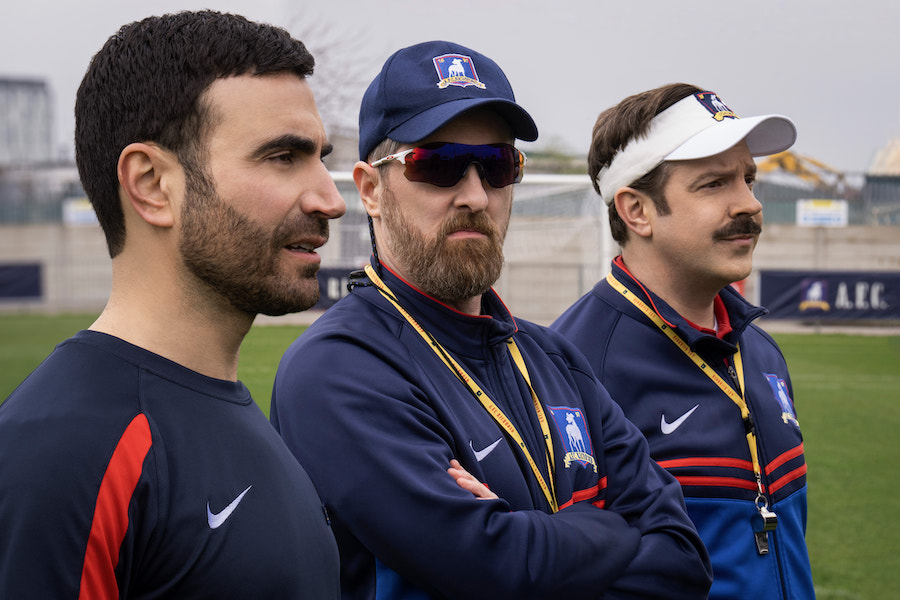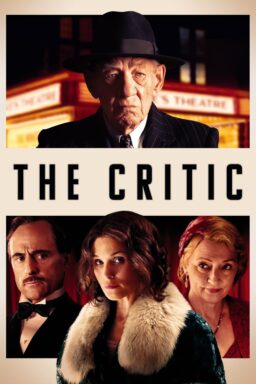"I wonder what the heck I'm still doing here," muses folksy coach and nicecore avatar Ted Lasso (Jason Sudeikis) near the start of his show's third (and potentially final?) season. It's a fair question for both character and show: Three seasons in, Ted doesn't seem to know much more about European-style football than he did previously (he leans on Brendan Hunt's deadpan Coach for that), and he feels ever further from his son and estranged wife—who's now dating their couples therapist, as if the knife couldn't be twisted further.
"Ted Lasso," like Ted Lasso, is going through an existential crisis of its own. The Apple TV+ show was a pandemic bastion, to be sure, a paean to the kind of niceness and positivity we'd like to believe will win the day amid a world that grows more cynical every passing moment. (It also managed to snag nearly a dozen Emmys for the trouble.) Season Two started to show the cracks in the Lasso firmament, as creators Sudeikis, Bill Lawrence, Brendan Hunt, and Joe Kelly struggled to build more dramatic angles with which to attack Coach Ted's omnipresent chipperness.
Season Three is a slight return to form, offering more time to hang out with its disarming, charming cast of characters. But even the show's warmth is starting to wear thin, especially now that the sunshine has to spread across more characters, settings, and conflicts.

When last season ended, Ted managed to pull his team through its season of ignominy after being relegated out of the Premier League; now, they're back in, but pundit after pundit predicts they'll end up in last place. If that's not enough, their quest to beat West Ham is doubly personal: Rebecca's (Hannah Waddingham) ex-husband Rupert (Anthony Head) just bought the team, and Ted's former protege Nate (Nick Mohammed) has taken a coaching gig under Rupert's wing. Add to that Roy Kent (Brett Goldstein) and Keeley Jones (Juno Temple) breaking up, and the latter pouring her focus on her new PR company, and you've got, as Ted might put it, more stories to juggle than a book-fair party clown.
Perhaps recognizing that "Ted Lasso" is a bit overstuffed, the first four episodes provided for review range from around 47-50 minutes in length, a step beyond the breezy half-hours the show is used to giving us. Granted, the latter act of Season Two also approached that runtime, but in Season Three, it feels necessary just to accommodate the seemingly-exponential number of plot threads bouncing around the series. In the first episode alone, there's a lot to unpack. There's Rebecca's zeal to beat Rupert at his own game (her purchase of Richmond, and Lasso's subversive hiring, kicked off the whole story in the first place). Nate struggles to fit into his new role as the "Wonder Kid" at West Ham, ruling with an iron fist and nasty words in press conferences, almost as a deliberate rejoinder to Ted's folksy positivity. And, of course, Ted himself is asking the big questions about whether it's even worth it for him to be here.
If none of that sounds particularly fitting for what was at one point TV's most well-regarded comedy, you wouldn't be wrong; "Lasso"'s third season is downbeat, almost to a fault, its sincerity muting the charms of a cast of characters we'd come to love and admire in its first season. Sudeikis' Ted is still a mercurial charmer, but we paradoxically learn less about him the deeper we dig into the character's sense of pathos. Goldstein's cartoonish gruffness, so charming at first, feels like a caricature at this point. Even Temple's oddball Keeley feels unmoored this season, adrift in her own subplots involving toxic friends and her own insecurities about her own job. (It's a big season for imposter syndrome sufferers.) And poor Sam (Toheeb Jimoh) and Dani (Cristo Fernandez), highlights of the team, are relegated to the background this season. Same goes for Jamie Tartt (Phil Dunster), now rarely seen outside the occasional heart-to-heart with Roy or showing us how Cockneys say the word "poopy."

Still, there are some highlights, and a few old and new characters get their time to shine. Mohammed was the stealth star of Season Two, Nate's heel turn building episode by episode as he bristles against Ted's cloying personality and the lack of attention he got from his mentor; now paired with Rupert (Head is deliciously devious here, the Palpatine to Nate's Vader), he searches for that validation with someone who'll show his approval by buying him a fancy sports car. Even in his villainy, Mohammed takes pains to show the glimmers of sadness within Nate—his big step out into the spotlight still hasn't filled that gaping void in his soul.
Another solid, if deliberately vestigial, addition to the cast is Maximilian Osinski's Zava, a rockstar footballer who might be the secret to Richmond's success this season. He kicks like Pele and dispenses advice like a guru, a combination that disrupts the status quo of the team in ways that will surely ripple throughout the season. He's a new kind of foil for Ted: The lynchpin whose victories come at the cost of the team's morale. One wonders how his leadership style will clash with Ted's; in fact, "Lasso"'s most intriguing throughline this season is exploring what it means to be a leader.
A mere four episodes in, "Ted Lasso" already has a lot of players out on the pitch, and many balls in the air. There are eight more episodes to go (and only eight, if the unconfirmed rumors about the show's end are any indicator), and plenty of time left in the match. Here's hoping all the place-setting this season sets Sudeikis et al. with a Hail Mary play to send the beloved show off on a satisfying note.
Four episodes were screened for review. The third season of "Ted Lasso" is now streaming on Apple TV+.












